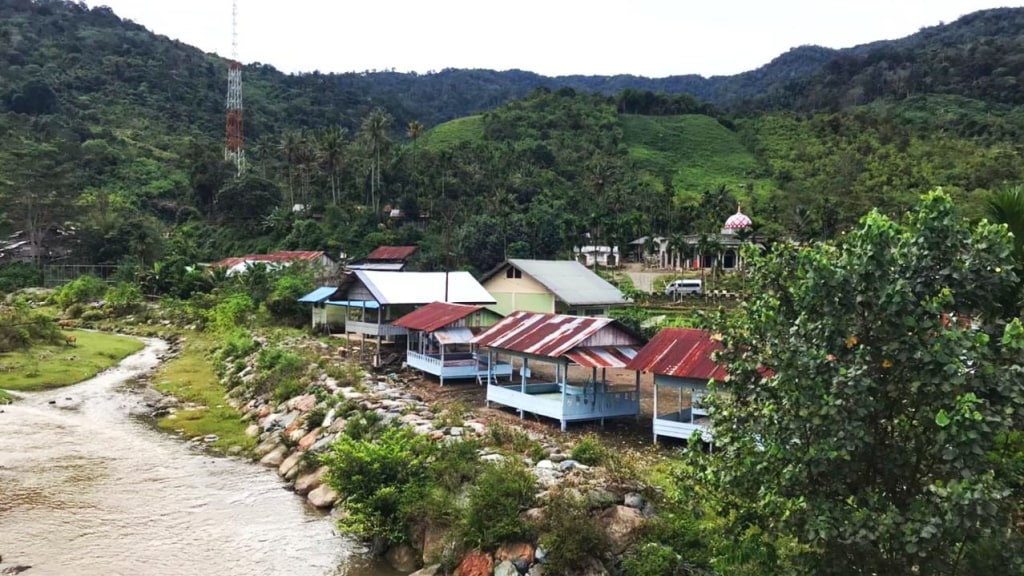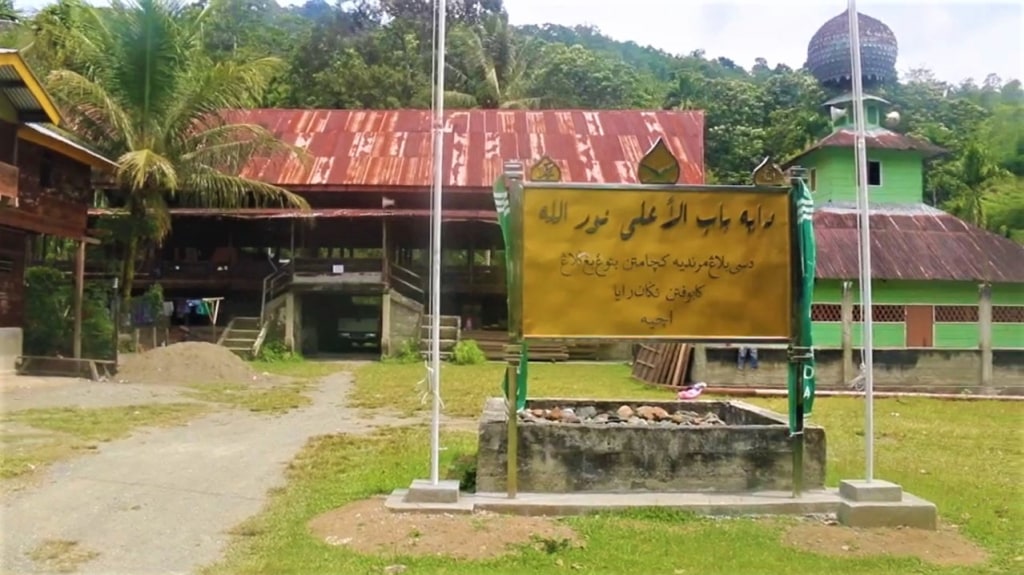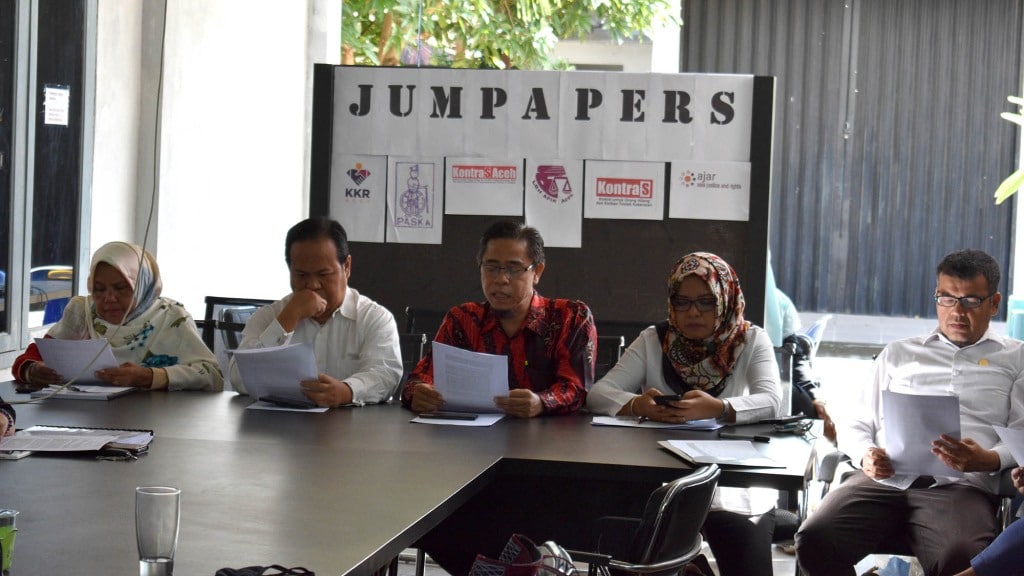The faint chanting of the Maghrib call to prayer was heard from a distance, we stopped at a hut on a hill overlooking the ravine. In the midst of the pouring rain, cold creeps along with a thin fog. Visibility is increasingly limited, the lights are faintly visible from residential areas in the Beutong Ateuh Benggalang District, Nagan Raya Regency, Aceh. At exactly 6:45 p.m., my cell phone rang. The…
At exactly 6:45 p.m., my cell phone rang. The caller is Yusri, the treasurer of Blang Puuk Village, one of the villages there. "Assalamualaikum, Have you arrived yet?" he asked. "Arrived at the hut on the edge of the cliff," I replied.
"It's not far away, it's about a kilometer journey to get here," concluded Yusri.
We continued our journey by motorbike in the middle of a light rain. Ten minutes passed, one by one the houses of residents began to be seen, until they arrived at the iron bridge connecting to the center of the Beutong Ateuh Benggalang sub-district. On the left side there is the office of the Resort Police (Polsek) and the Beutong Ateuh Military District Post, on the opposite side there are several grocery stores that have just opened.
After crossing the bridge, Yusri welcomed us and guided us to his house, about 500 meters from the end of the bridge. Yusri's wife served us hot tea, while we drank together. The cold brought drowsiness, and we fell asleep in the house.
Visiting Beutong Ateuh Benggalang, I along with several other journalists have an agenda, wanting to record the condition of the interior areas on the border of Nagan Raya and Central Aceh. About development, natural beauty and people's memories of the tragedy of past human rights violations.

Saturday morning (9/1/2021), the sun appeared on the horizon. A gentle breeze brings coolness along with the chirping of birds and the boisterousness of the crickets. Yusri's wife had prepared breakfast for us, and soon Yusri took her around the village.
Away from the noise, Beutong Ateuh District is located in the valley of Mount Singgah Mata, and flanked by Mount Abong-abong and Mount Tangga, in the Bukit Barisan cluster. It has an area of about 585.88 square kilometers, there are five villages there; Villages of Blang Puuk, Blang Meurandeh, Kuta Teungoh, Babah Suak and the preparation village of Pintu Angen.
Located about 75 kilometers from the center of Nagan Raya Regency, the location must be passed by an uphill and turning route, as well as crossing Mount Singgah Mata which is at an altitude of 2,800 meters above sea level.
Yusri said, the residents there depend on their fertile land for living, farming, farming, and raising livestock. This area is also rich in natural resources, its gold content was once about to be exploited by a mining company. But the residents refused his presence.
The Tragedy of the Aceh Conflict
Behind the serene nature, Beutong Ateuh holds old memories that have not faded from the people's memories, the tragic story of the massacre of Teungku (Tgk) Bantaqiyah and his students at the Babul Mukarram Islamic boarding school on July 23, 1999 by the Indonesian National Army (TNI). At that time, the conflict was still raging, after GAM declared Aceh's independence since December 4, 1976.
Teungku Bantaqiyah is a well-respected cleric in Aceh, at that time the location of his pesantren was still incorporated in the West Aceh Regency area. He is known as a consistent scholar. Therefore, many negative images are given to damage the good name of the Tengku.
He had been ostracized by a number of issues, such as teaching heresy, but was not affected. His studies were never quiet. Failing with the issue of deviant sects, Bantaqiyah was hit with the legalization of marijuana. In 1993, the authorities arrested Tengku Bantaqiyah on the grounds that he owned a marijuana plantation with which he supported the Security Disruption Movement (GPK), the government's official designation at the time for the Free Aceh Movement (GAM). This case resulted in him being sent to the Tanjung Gusta Penitentiary in Medan. He was sentenced to 20 years in prison.
The wave of reforms that occurred in Indonesia made the Suharto regime with its New Order collapse by the student movement, in May 1998. This brought BJ Habibie to the top of power. During his time, political prisoners and political prisoners were granted amnesty. Bantaqiyah was one of the political convicts pardoned by President Habibie.

After being freed from Tanjung Gusta, Bantaqiyah returned to his village in the interior of Nagan Raya. Since returning to Beutong Ateuh on May 28, 1999, Tgk Bantaqiyah has not wanted to teach the Koran anymore. However, at the request of the community, he finally re-opened the study. Every Friday, residents came to the hall to study the Koran and the yellow book, until the tragedy occurred just before Friday prayers, July 23, 1999.
The massacre started at around 11.00 WIB, Tgk Bantaqiyah and dozens of his students were at the study hall when hundreds of TNI personnel came to the pesantren. They shouted ordering everyone to gather. The Islamic boarding school was suspected of harboring weapons and supporting GAM, but the allegations were never proven.
There had been a dialogue between Bantaqiyah and the authorities, but the contents are unknown. Suddenly, a number of soldiers opened fire. Tengku gave a signal for the residents and their students to lie down to avoid being shot.
Panic, crying, screaming collided between the whirring of bullets. Tgk Bantaqiyah fell on the third shot. By Friday, the Tengku Bantaqiyah study center complex had turned into a killing 'field'.
In a report submitted by KontraS and the Aceh Human Rights NGO Coalition, it was recorded that 57 residents of the Babul Al-Mukarramah Islamic Boarding School were victims, including Tgk Bantaqiyah. There were as many as 34 bodies who died in the pesantren, as many as 23 other pesantren residents were found a few days later in the seven kilometer ravine of the Beutong Ateuh-Aceh Tengah route.
The case received serious attention from the state. President BJ Habibie issued Presidential Decree No. 88/1999 on the Independent Commission for Investigation of Violence in Aceh (KIPTKA). Tragedy was investigated, until a number of perpetrators were tried through the Connectivity Court.
As many as 25 TNI soldiers were brought to the court to be held accountable for their actions. The inaugural trial of the Connectivity Court in Banda Aceh was held on Wednesday, April 19, 2000. Only one person responsible for the massacre was unable to be brought to justice, Lieutenant Colonel Sudjono, at that time serving as Pasie Intel Korem 011/Lilawangsa, until now his whereabouts are still a mystery.

"Tragedy occurred in Blang Meurandeh Village," said Yusri. The village is a neighbor of Blang Puuk Village, where Yusri lives. We were brought by Yusri there. On the way we passed the Babul Mukarramah Islamic boarding school which was the site of the massacre of the cleric and the santri. The place looked deserted, from outside the fence there seemed to be no activity. Pausing for a moment, we continued our journey to Tgk Malikul Aziz's house. He is the son of Tgk Bantaqiyah who is currently the leader of the pesantren left by his father.
A long-sleeved black shirt and a cap on his head, he came to see us. Tgk Malikul asked about our intention there. However, when he was flicked about the tragedy of 1999, his face immediately changed, the tone of his voice rose. He didn't want to remember, let alone discuss the incident.
"Because the Beutong people are all victims of conflict, people are angry, why are they asking about (past) conflict again," he said in Acehnese.
Tgk Malikul Aziz, said he was reluctant to remember let alone discuss the incident because it would only reveal black memories. According to him, when it comes to caring after the incident, almost none at all. In his memory, there was only a personal assistance from a central official of Rp 800 million. “With that money, a mosque was built, and for conflict victims, it was given to other people. You can ask the person who received it, because I didn't accept it," he said.
After the assistance, continued Malikul Aziz, the victims never received any kind of attention or assistance. “There is no help, let alone psychological recovery, nothing. You don't have to think about it anymore, because it was never given," he said.
He said, If converted into rupiah, the loss suffered by his family due to the brutality of the officers who burned the boarding school to the livestock that was killed by bullets, reached Rp 2 billion. That's not to mention the damage caused by trauma to the victim's family.
“The Islamic boarding school was built with its own money, the money for the congregation's alms. It used to be all burned, just look at the condition of the dayah. It is now (rebuilt) from the alms of the congregation, the alms of the villagers," he explained.

Tgk Malikul Aziz said that in the past he had proposed funding for the rehabilitation of pesantren and for victims of conflict through the Aceh-Nias Rehabilitation and Reconstruction Agency (BRR). However, until now there is no definite news about this. Then they despair and choose to save the dark history, start a new life.
“If it was a loss at that time, there's no need to bring it up again, someone already came but was ignored like the BRR proposal in the past. Went (here) to calculate our losses which reached 2 billion, but it was not paid for," he concluded.
Trauma still lingers
Reluctant to talk about past memories, felt R, one of the children victims of the tragedy. At the time of the incident, R saw firsthand how his father was tortured, then transported by the authorities using a truck to Takengon (Central Aceh) under the pretext of wanting to be treated. But then wasted.
At that time, R along with his mother and three older siblings had to fight hard to find his father's grave. After two years of searching with the help of local residents, the tomb was found in a village in Central Aceh. Five months later, his mother became seriously ill and died.
"For two years we searched, because at that time people did not dare to say, After getting my father's grave, Mamak was seriously ill," he said.
Initially, R wanted to talk about the trauma he experienced. But later refused on the pretext of not wanting to remember the dark times that until now have not received justice. "It's okay, there's no need to write it down anymore, it's not important at all, from the past many people have asked my brother's family from journalists, but nothing has changed."
"Now you don't have to ask anymore, it hurts. If you say you get the right you deserve, it will never be replaced by what people have done for your family, but we are sincere," concluded R, refusing to have his identity written down.
Yusri understands the attitude of the victims' families. According to him, the attitude shown by all conflict victims in their area is fairly similar, it will be disturbed if asked about dark times and justice which until now has not been felt.
"People who are victims of conflict here when discussing the issue of the massacre at that time were angry, disappointed, didn't want to bring it up for a long time, were traumatized, we cry when we remember that. Because no one cares," he said.
Another resident, Tarmizi also said the same thing, he said that all the victims of the conflict in the Beutong Ateuh Benggalang area had not received justice, let alone for psychological recovery, material compensation that had been lost at that time had not been fully paid.
“After the conflict, there was never anything (assistance). There is only a mosque next to the pesantren, and even then private money not from the government. If it's from the government, it doesn't exist at all. We are not the only victims, livestock are also victims such as buffaloes. Even though what animal was wrong with him, he was killed and shot," he concluded.
Meanwhile, the Chair of the Working Group for Disclosure of Truth at the Aceh Truth and Reconciliation Commission (KKR), Evi Narti Zain, said that his party had not yet taken a comprehensive statement on the victims of the Teugku Bantaqiah tragedy. "For the Beutong Ateuh case, in principle, we have carried out an analysis of the case, because there has been a legal decision, but we have not taken a statement to every victim related to the case," he said.
The Aceh KKR itself admitted that it had never carried out activities such as memorializing the victims in Beutong Ateuh because there were several factors that became obstacles, one of which was time and a special approach to the victims. He said that in the near future in 2021, the Aceh TRC plans to visit there.
"Because our work recommends for reparations, then for the reconciliation process there must be a special approach, and what we will do there is to carry out memorials later and there have been initial discussions with the leadership of the pesantren," he said.

The head of the Aceh TRC, Afridal Darmi, said that the first mandate of the Aceh TRC was to reveal the truth about human rights violations, then recommended reparations to victims.
"Only after the truth is revealed by the TRC, then we can talk about reparations or simply providing relief assistance to victims so that they can be recovered from suffering human rights violations," he said.
"So if, for example, we are asked what assistance has been given to the victims of the Teungku Bantaqiyah tragedy, we cannot answer because the truth disclosure has not been carried out (TRC)," he concluded. []
Note: The author is a fellowship recipient of the Human Rights, media and transitional justice training organized by AJI Banda Aceh, KontraS Aceh, LBH Banda Aceh and AJAR.s
[Acehkini/Siti Aisyah]
